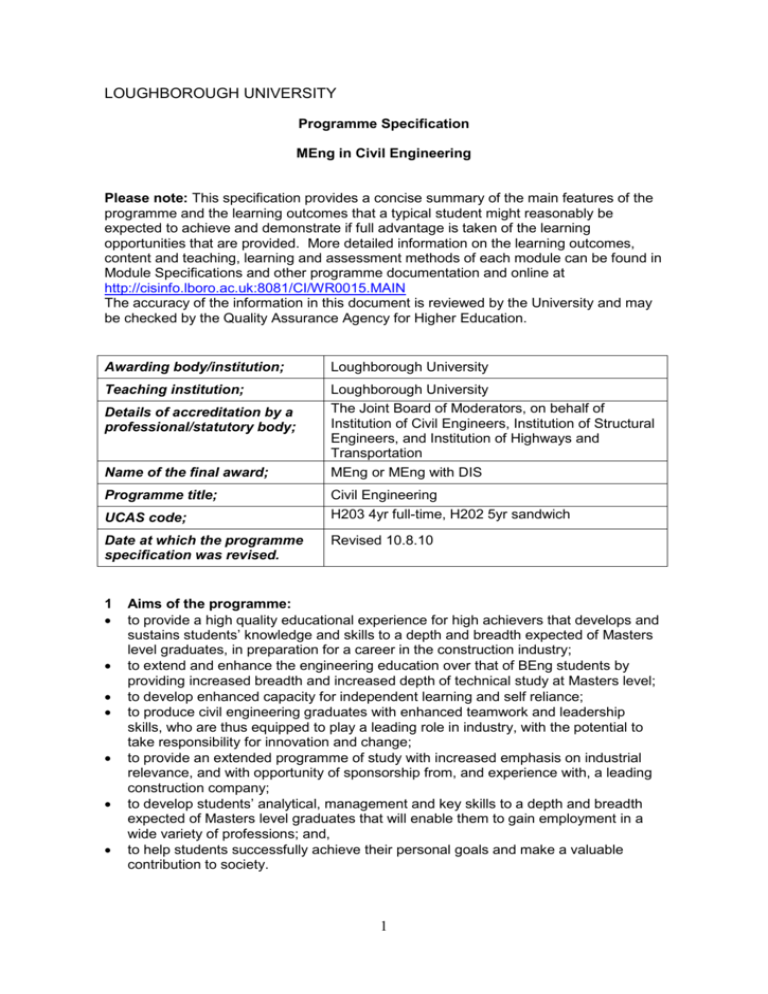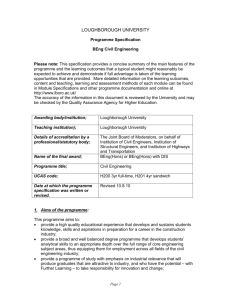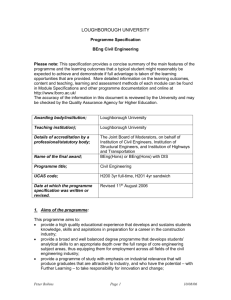Civil Engineering (Extended) - MEng
advertisement

LOUGHBOROUGH UNIVERSITY Programme Specification MEng in Civil Engineering Please note: This specification provides a concise summary of the main features of the programme and the learning outcomes that a typical student might reasonably be expected to achieve and demonstrate if full advantage is taken of the learning opportunities that are provided. More detailed information on the learning outcomes, content and teaching, learning and assessment methods of each module can be found in Module Specifications and other programme documentation and online at http://cisinfo.lboro.ac.uk:8081/CI/WR0015.MAIN The accuracy of the information in this document is reviewed by the University and may be checked by the Quality Assurance Agency for Higher Education. Awarding body/institution; Loughborough University Teaching institution; Loughborough University The Joint Board of Moderators, on behalf of Institution of Civil Engineers, Institution of Structural Engineers, and Institution of Highways and Transportation MEng or MEng with DIS Details of accreditation by a professional/statutory body; Name of the final award; Programme title; UCAS code; Date at which the programme specification was revised. 1 Civil Engineering H203 4yr full-time, H202 5yr sandwich Revised 10.8.10 Aims of the programme: to provide a high quality educational experience for high achievers that develops and sustains students’ knowledge and skills to a depth and breadth expected of Masters level graduates, in preparation for a career in the construction industry; to extend and enhance the engineering education over that of BEng students by providing increased breadth and increased depth of technical study at Masters level; to develop enhanced capacity for independent learning and self reliance; to produce civil engineering graduates with enhanced teamwork and leadership skills, who are thus equipped to play a leading role in industry, with the potential to take responsibility for innovation and change; to provide an extended programme of study with increased emphasis on industrial relevance, and with opportunity of sponsorship from, and experience with, a leading construction company; to develop students’ analytical, management and key skills to a depth and breadth expected of Masters level graduates that will enable them to gain employment in a wide variety of professions; and, to help students successfully achieve their personal goals and make a valuable contribution to society. 1 2 Relevant subject benchmark statements: The modular MEng programmes were first introduced in 1995. The aims, intended learning outcomes and curriculum are continually reviewed and currently take account of UK-SPEC, the 2005 JBM Accreditation Guidelines, the 2006 QAA Engineering Benchmark statements for Engineering, and the Framework for Higher Education Qualifications, as well as input from our industrial contacts. 3 Intended Learning Outcomes When students have completed the MEng in Civil Engineering, and if they have taken full advantage of the opportunities for learning that we provide, they should have gained: Knowledge and understanding of: 1 Relevant mathematics, science and engineering principles in the field of structures, geotechnics, water engineering and surveying 2 The properties, behaviour, fabrication and use of relevant materials 3 Construction technology and civil engineering practice 4 The management of projects through planning, finance, contract procedures and quality systems 5 Principles of design specific to civil engineering 6 The role of codes of practice and the regulatory framework in design and practice 7 The principles, importance and management of relevant information technology 8 The role of the professional engineer in society, including health, safety and environmental issues 9 Team roles, team-working skills and leadership skills 10 Relevant research methods 11 Civil engineering education, design and practice in a European context (Socrates option in Part D) The thinking skills to: 1 Demonstrate a high level of competence in identifying, defining and solving engineering problems 2 Select and apply appropriate mathematical and computing methods for modelling and analysing engineering problems. 3 Apply appropriate analytical techniques and codes of practice to the design of components and systems 4 Evaluate and integrate information and processes through individual and group project work 5 Define, plan, conduct and report on an original research project 6 Identify and apply appropriate project management techniques 7 Evaluate alternative techniques and strategies for managing people at work 8 Analyse and interpret financial information 9 Apply engineering principles, theories and methods in a professional environment through a twelve month period of work experience (DIS programme only). The practical skills to: 1 Use laboratory and field equipment competently and safely 2 Observe, record, process and analyse data in the laboratory and in the field 3 Use appropriate specialist computer software 4 Prepare technical reports and give technical presentations 5 Prepare technical drawings both manually and using CAD 6 Apply knowledge and skills in a professional environment through a twelve month period of work experience (DIS programmes only) 2 The Key skills to: 1 Communicate effectively using written, oral, graphical and presentational skills 2 Use IT effectively (WP, spreadsheets, databases, presentations, CAD, email, WWW and specialist software) 3 Use mathematical skills appropriate to an engineer 4 Work independently 5 Work in a team environment and manage a small team 6 Manage workloads and time effectively 7 Work with limited or contradictory information 8 Monitor, plan and reflect upon personal, educational and career development (PDP) 9 Communicate effectively at a professional level in a second European language (Socrates option only). Learning and Teaching Methods Acquisition of the above knowledge, understanding and skills is through a combination of lectures, tutorials/examples classes, seminars, laboratory work, field work, practical classes, teamwork projects, an outdoor management development course, an individual research project, industrial training (DIS students only), study at an Overseas University (European, Socrates and International options only), private study and coursework throughout the programme. Assessment Knowledge, understanding and skills are assessed through a combination of written examinations and coursework in the form of laboratory reports, problem solving exercises, design projects, field course reports, oral presentations, essays, multiplechoice questionnaires and a research project report and presentation. The assessment over the whole programme is split approximately equally between examinations and coursework. 4 Programme Structure The MEng in Civil Engineering is offered as a full-time programme of four years or a sandwich programme of five years if taken with the optional year of industrial training leading to the award of a Diploma in Industrial Studies DIS. Each Part (academic year) of the programme is taught in two semesters and students study modules with a combined weight of 60 credits in each semester. Full details of the programme regulations can be found at: http://www.lboro.ac.uk/admin/ar/lps/progreg/year/1112/index.htm 5 Criteria for admission to the programme Applicants must satisfy the general requirements of the University and one of the following programme requirements: A level qualifications AAB at A2 level, including Mathematics and excluding General Studies and Critical Thinking. VCE qualifications 340 points from 18 units (either VCE units alone or a combination of VCE units and AS or A level units), including at least grade B in the mathematics units. BTEC HNC/HND Year 1 entry: averaging distinction, with distinction in engineering mathematics. Year 2 entry: majority of Distinctions at Level 4 (including Engineering Mathematics) BTEC NA/NC/ND 3 340 points from 18 units (either BTEC National units alone or a combination of BTEC National units and AS or A level units), including Distinctions in mathematics units (BTEC) and/or at least grade B in Mathematics (A or AS level). International Baccalaureate 36 points, including at least 5 in Mathematics (at Higher level) and Physics European Baccalaureate 75% (including English and mathematics) French Baccalaureate Overall score of 15 points (including English and mathematics) Advanced Scottish Highers AB including Mathematics Scottish Highers AABBB, including at least grade B in Mathematics Irish Highers 340 points from four Highers, including Mathematics at grade B French Baccalaureate 16 (including English) Second year entry Second year entry may be offered to candidates with appropriate qualifications. Examples include diplomas from Malaysia and Singapore, higher diplomas from Hong Kong, and HNDs from the UK. Additional requirements GCSE Physics or Double Science grade C 6 Information about assessment regulations Criteria for progression and Degree Award (i) In order to progress from Part A or Part B candidates must obtain 120 credits in each Part, and must normally obtain a minimum overall average mark of 60% in each Part. (ii) In order to progress from Part C or to qualify for the award of an MEng Degree in Part D, candidates must obtain 120 credits in each Part. Any candidate who fails to progress from Parts A or B may transfer to the appropriate Part of the BEng programme in Civil Engineering, before or after re-assessment, provided that the candidate has satisfied the progression requirements for that programme. Any candidate who fails to progress from Part C may, at the discretion of the Examiners and subject to completion of an individual Research Project, be awarded a BEng in Civil Engineering with a classification based on the candidates performance in relevant Part B and C modules, using modules and weightings appropriate to the BEng Programme. Any candidate who fails to qualify for the award of the MEng Degree in Part D may, at the discretion of the Examiners, be awarded a BEng in Civil Engineering with a classification based on the candidate’s performance in Parts B and C together with the individual research project (CVD002), using modular weightings appropriate to the BEng programme. Degree Classification Candidates’ final degree classification will be determined on the basis of their performance in degree level Module Assessments in Parts B, C and D, in accordance with the scheme set out in Regulation XX. The average percentage mark for each Part will be combined in the ratio Part B 20: Part C 35: Part D 45 to determine the final programme mark. 4 Re-assessment Provision will be made in accordance with Regulation XX for candidates who have the right to re-assessment Part A, B or C of the programme to undergo re-assessment in the University's special assessment period. 7 What makes the programme distinctive The programmed prepares students for a career in the construction industry by providing a broad-based education in civil engineering with a wide range of options available in the final two years. Our graduates continue to be popular with industry and the employment record for our civil engineering graduates is excellent. The programme has an option of an industrial placement year, taken after the second year at university. Successful completion of this leads to the award of Diploma of Industrial Studies (DIS). There is strong demand from industry for our second year students that opt for the DIS year. Reports from employers are generally very positive, and many graduates are subsequently employed by the companies with whom they undertook industrial training. The department has an industrial sponsorship scheme set up to give first year MEng students the opportunity to apply for sponsorship once they are in their first year at Loughborough. The scheme provides an annual bursary, a twelve month industrial placement period and summer work if required. The scheme was started in 2001. In the National Student Surveys (2005 -2008), designed to measure the level of students' satisfaction with their university experience, the department achieved very high rankings, including two in first place for the Civil Engineering category. In the most recent survey the Civil Engineering programmes were ranked joint 3rd with 97% student satisfaction The programme is accredited by the Joint Board of Moderators on behalf of the Institution of Civil Engineers, the Institution of Structural Engineers, and the Institution of Highways and Transportation. The last JBM visit was in February 2006 and the report received was very positive and noted many examples of good practice. Amongst the examples of good practice highlighted for inclusion in the JBM’s annual report were; the outdoor management course; the industrial sponsorship scheme (which the JBM said provides financial support, industrial placement opportunities and employment opportunities for a large number of students); the MEng Teamwork Design Project run with support from industry and involving a real site under development; and the development of sustainable solutions to engineering problems through the Development Project module, based around the annual New Civil Engineer Communication Competition. 8. Particular support for learning: Please refer to http://www.lboro.ac.uk/admin/ar/templateshop/notes/lps/ 9. Methods for evaluating and improving the quality and standards of learning: The University’s formal quality management and reporting procedures are laid out in its Academic Quality Procedures Handbook, available online at: http://www.lboro.ac.uk/admin/ar/policy/aqp/index.htm These are under the overall direction of the Pro-Vice-Chancellor (Teaching). 5







